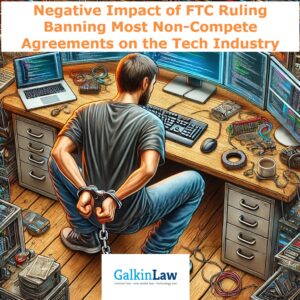
The FTC issued a final rule banning non-compete clauses on April 23, 2024. The FTC’s ruling banning non-compete agreements is intended to promote competition and employee mobility, but it could have several negative impacts on the tech industry. However, there have already been several challenges to the FTC ruling, and, especially with the abandonment of the Chevron Deference Doctrine by the Supreme Court on June 28th this year, the FTC ruling might not survive the judicial scrutiny.
- Loss of Trade Secret Protection
Non-compete agreements are often used in the tech industry to protect sensitive information and trade secrets. Without these agreements, companies might find it more challenging to safeguard proprietary technologies and processes from being taken to competitors by former employees. This can lead to a greater risk of intellectual property theft and increased vulnerability to competitive threats.
- Reduced Investment Incentives
Startups and small tech firms, in particular, rely on non-compete agreements to secure investments. Investors may be hesitant to fund companies that cannot protect their innovations through non-compete clauses, potentially leading to a reduction in available capital for tech startups. This can hinder the growth and development of new technologies and companies.
- Talent Poaching and Increased Turnover
The absence of non-compete agreements could lead to higher employee turnover as competitors actively recruit talent from each other. This increased mobility can disrupt project continuity and team stability, making it harder for companies to retain skilled employees and maintain long-term projects. The costs associated with hiring and training new employees could rise, impacting overall productivity and innovation.
- Competitive Disadvantages
Large tech companies might face competitive disadvantages as smaller firms and startups gain easier access to experienced talent without the constraints of non-compete agreements. While this might seem beneficial for smaller players, it can disrupt the competitive balance and potentially lead to an uneven playing field where established companies struggle to protect their business interests effectively.
- Litigation and Compliance Costs
The transition to a non-compete-free environment could lead to increased litigation as companies navigate the new regulatory landscape. Legal disputes over the enforceability of existing non-compete agreements and the adjustment of employment contracts to comply with the new rules could result in substantial legal and administrative costs for tech firms.
Conclusion
While the FTC’s ruling aims to enhance worker freedom and stimulate innovation, it poses several challenges for the tech industry, including the protection of trade secrets, investment incentives, talent retention, competitive dynamics, and legal compliance. These factors could collectively impact the industry’s ability to innovate and grow effectively.
#TechIndustry #NonCompeteBan #FTCRuling #InnovationChallenges #TradeSecrets
